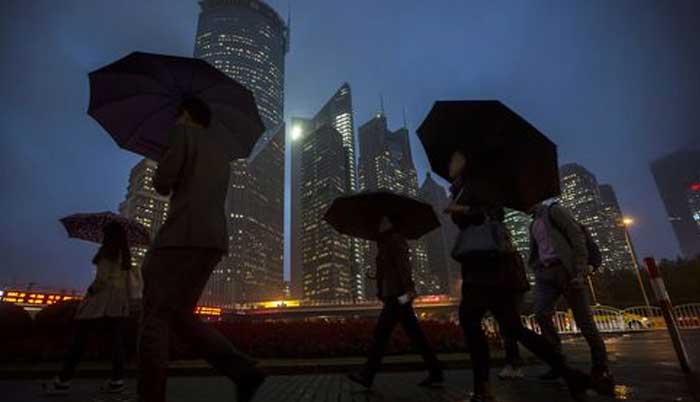![]() Home > World Business
Home > World Business
How China's Debt Crackdown Could Start Weighing On The Economy

![]() December 12th, 2017 | 09:35 AM |
December 12th, 2017 | 09:35 AM | ![]() 742 views
742 views
CHINA
China’s sweeping deleveraging push is poised to inflict more pain next year.
Authorities tightening funding in financial markets and reining in excessive borrowing will likely deal a blow to investment in infrastructure and property, while soaring corporate funding costs may damp business expansion.
That could add to headwinds facing an economy expected to grow at the slowest pace in more than a quarter century next year, complicating the balancing act for policy makers who want to defuse the country’s debt bomb without derailing the expansion.
When the central bank turns down the credit tap, governments and companies are less keen to build roads, railways and other infrastructure. Often a key prop to the expansion, such construction is expected to decelerate next year, weighing on economic growth.
When banks sneeze, property developers often catch cold first. Real estate made up 17 percent of all fixed-asset investment last year, and accounts for an even larger share of total economic output if related industries are included. The sector has close interconnections with steel and cement makers, producers of excavators and bulldozers, and of course real estate agents.
Corporate bond issuance is on pace to drop in 2017 for the first time in four years as surging yields make selling debt more expensive. Banks will also likely charge higher premiums on top of benchmark loan rates, raising the overall financing costs for companies, according to Nathan Chow, an economist at DBS Bank Hong Kong Ltd. That means companies may invest less in business expansion, he said.
It’s getting pricier for banks to get funding, as the seven-day reverse repurchase rate and yields on negotiable certificates of deposit have surged amid tighter liquidity. This means the lenders must charge higher rates for loans, especially those made to smaller private companies, to keep making a profit, Chow said. That gives another boost to corporate funding costs.
The yield premium for China Development Bank bonds over government debt surged past 1 percentage point last month. The debt selloff, triggered by concerns about the deleveraging push and tighter liquidity, poses an increasing challenge to the credit CDB and other policy banks extend because they use market funding rather than deposits. This could be a drag on growth as those funds go to everything from renovating shantytowns to Belt and Road Initiative projects across Asia, Europe and Africa.
The financial services industry accounts for roughly 8 percent of China’s gross domestic product, yet it’s the sector most directly impacted by borrowing curbs, as banks and brokerages charge fees on debts issued and stocks sold.
China’s stocks will trade weaker than current levels for much of next year as deleveraging crimps credit growth and keeps interest rates elevated, according to Bocom International Holdings Co.’s Hao Hong. That would damp the output from financial services, which is more closely tied to equity markets and can affect overall growth by 0.5 percentage point.
Source:
courtesy of BLOOMBERG
by Bloomberg News
If you have any stories or news that you would like to share with the global online community, please feel free to share it with us by contacting us directly at [email protected]